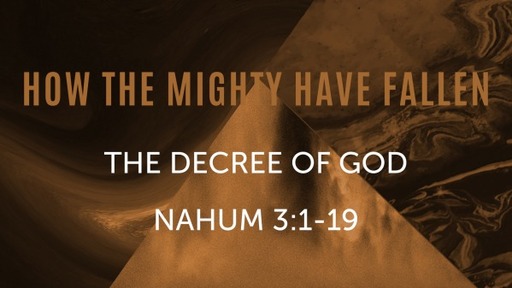How the Mighty Have Fallen

Woe, as an interjection used in lamenting the dead (1 Kgs 13:30; Jer. 34:5; cf. Amos 5:16), is used with an extended meaning in the prophetic literature to introduce a dire threat (Isa. 5; Hab. 2). Its force is that the punishment threatened is so certain that those addressed are as good as dead. This is accentuated in Hebrew by the lament or qînâ metrical pattern (3 + 2) in the first half of the verse. The use of the form here is ironic, since the demise of the tyrant would be welcomed, not mourned. The ‘bloody city’ (RSV), Nineveh, is lamented. She who was the place of lies (Hos. 7:3), plunder and ‘prey’ (the latter a recollection of the oracle in 2:11–13) will now find her position reversed, receiving the destruction she had previously dispensed.
God knows the hearts of nations (Nahum 3:1-4)
God brings arrogance to shame (Nahum 3:5-7)
God overthrows exploitative gain (Nahum 3:8-15)
God will conquer even the most mighty (Nahum 3:16-19)
e. How the mighty have fallen (3:18–19)
In a closing address directly to the Assyrian monarch, the complete lack of support for leader and population shows the irreparability of the nation’s position.
18. The king is told that his shepherds, those invested with responsibility for the direction and rule of the people (Jer. 17:16; Zech. 10:2–3), and his nobles are sleeping on the job. They will provide no help in the coming invasion. Neither will the general population who have dispersed. Restoring the scattered people should be the duty of the shepherds, but they are not fulfilling it.
19. Assyria the mighty is dying from an incurable wound. Due to her own endless cruelty and exploitation of others, this extremity is viewed not with compassion but with joy, as those who hear of it exult with clapping hands (cf. Pss 47:1; 98:8; Isa. 55:12; Ezek. 25:6). Foremost among those rejoicing would be Judah, for whose encouragement and support the prophecy is given. Rejoicing is not in this context gleeful gloating at the misfortune of others (cf. Ps. 22:17; Obad. 12; Rev. 11:10), an attitude which is unacceptable for the people of God. Rather, it is pleasure at the vindication of God and his promises. His justice and holiness are upheld because, not only is he gracious to bless those who turn to him in repentance, he is also righteous in his dealings with sin and rebellion against himself and his people (cf. Rev. 11:16–18; 15:3–4; 16:4–7). One’s response as an individual or as a nation to God and his will, whether in acceptance or rejection, thus has major implications for blessing or judgment.
